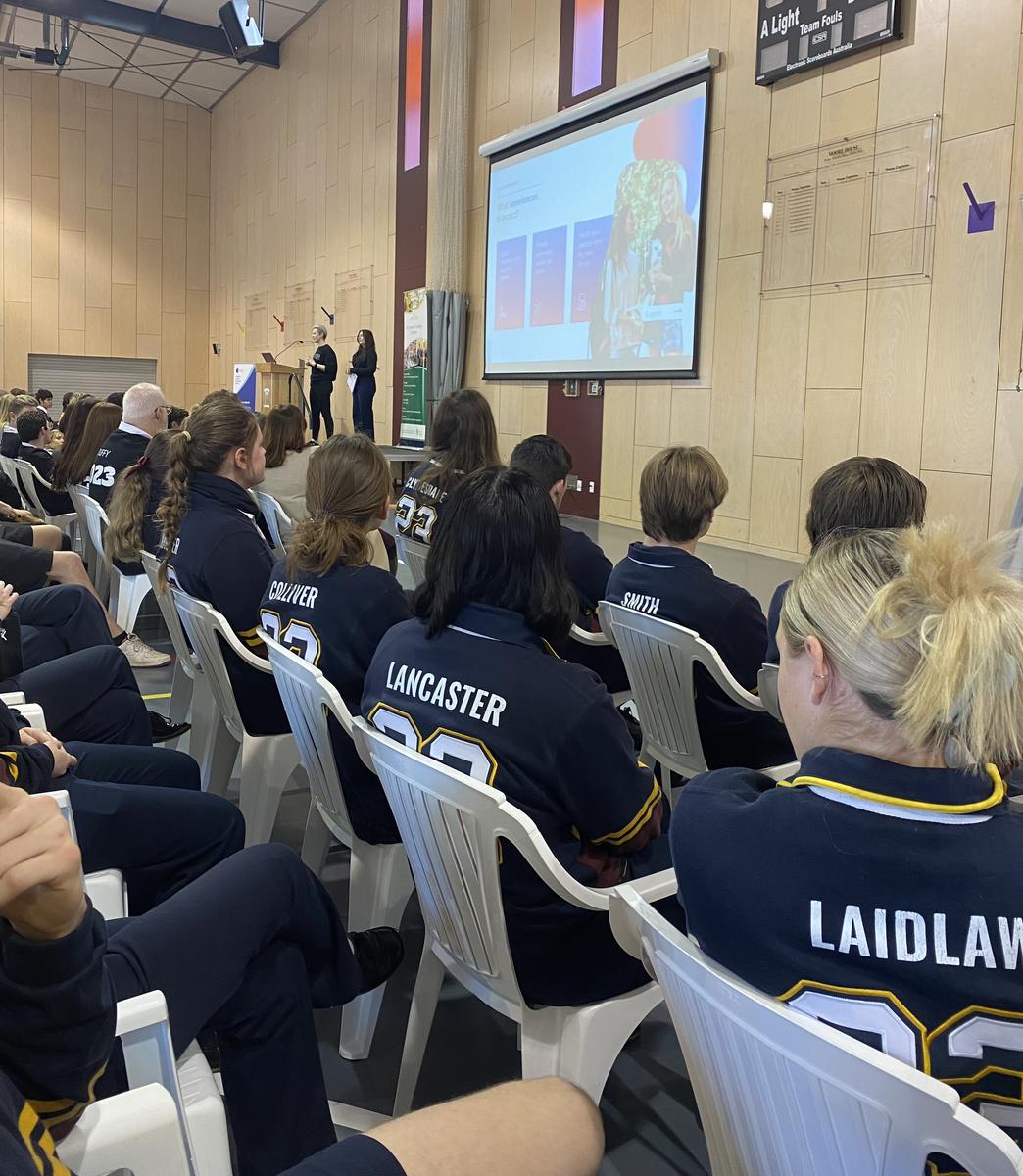9-12 Community News

Welcome to the start of Term 3.
Students and staff in the 9-12 Community have hit the ground running as we commence Term 3. Everyone has returned refreshed and energised, with a number of students competing in the inter-school netball and football competitions.
The 9/10 and 11/12 girls each had two wins in netball and the 9/10 girls and boys football teams came away from their games very happy with their performances. Well done to all those involved in representing the college.
Our Years 9 and 10 students also had the opportunity to attend a performance of the show 'Smashed', which raised important topics and issues around the impact of alcohol in society. The show was aimed at empowering young people to make positive decisions around the use of alcohol and explore the dangers and consequences when alcohol is misused. It was an entertaining and thought-provoking performance that was a valuable learning experience for our students.
While the cold winter mornings may be discouraging to some of us, the Units 3/4 Outdoor and Environmental Studies class are excited, as it means that there will be plenty of snow to experience when they head to their Alpine camp next week.
As our Year 12 students begin the last semester of their secondary school years, they have taken the opportunity to visit a Tertiary Information Service (T.I.S) session, where they were able to explore the range of career, tertiary and post-school pathway and employment opportunities that are available to them as they look beyond the end of their secondary education.
With the end of year beginning to come into view for our Year 12s (and Year 11s completing a Unit 3/4 subject), we would like to present the information below to students and their families. This article presents a helpful guide for parents and caregivers in the lead up to the Unit 4 SACs and for examination preparation and revision. Exams, assessment tasks and assignments can be testing times for all students and parents alike. The article contains valuable information and helpful strategies designed to assist young people during these stressful times.
Information in this article is directly connected to the work we do with students through The Resilience Project, Success Integrated and Elevate.
We look forward to working in partnership with you again this semester and look forward to seeing you on-site for TA meetings and Subject Teacher Conversations later in the term. As always, please feel free to contact your child/ren’s TA should you have any queries or concerns.
Michelle Downie Brad Downie
9-12 Community Leader 9-12 Community Leader
Wellbeing Student Learning
Testing Times: How to deal with exam anxiety
Source: https://theparentswebsite.com.au/testing-times-how-to-deal-with-exam-anxiety/
Tests, exams, assessments – the mere mention of these to some teens can cause anxiety to escalate, writes Dr Deborah Trengove. She shares her strategies to help overcome the feeling during testing times.
From class spelling tests to Year 12 SACs, and everything in between, tests are part of school life. In an extended format, they are known as exams: timed assessments of learning and skills.
Over the years I have worked with many young people who have found tests and exams to be anxiety-producing experiences. Some have described going blank, forgetting all their hard-earned knowledge. Others get the shakes, their heart races or they become overwhelmed by the fear of bad grades. Some become too afraid to have a go and others race through making simple mistakes.
These are all normal responses to a perceived threat, albeit a psychological one. Test anxiety can inhibit a student representing all they have learned, causing frustration and disappointment that they have not performed as well as they wanted to, creating worry for the next test or exam.
The anxiety response
It helps to understand the mechanism which is creating this anxiety response. It emanates from the amygdala, the alarm centre of our brains. The amygdala sets off a flight, fight or freeze reaction, depending on the situation, personality, beliefs and previous experiences or memories. The racing heart, going blank or sweaty palms are all normal bodily reactions activated in response to a threat. However, when in a test or exam, the threat is on a piece of paper and students cannot flee out of the room, freezing doesn’t help and starting a fight is not an option! In this heightened state, the frontal lobe cannot perform its problem-solving functions, so questions are mis-read, answers forgotten and mistakes made, increasing the cycle of stress and panic.
The fear
When probed about the perceived threat in a test, many young people describe their fear of not doing well, of making mistakes or of disappointing their parents and teachers. As they get older, this fear is exacerbated by the consequences of poor performance. I have often heard senior students explain that if they do badly on an exam, they could get a bad ATAR score. If they get a bad ATAR score, they won’t get into a good university. Then they won’t get a good job and their entire life will be on the scrap heap. No wonder they feel anxious – it feels like their whole future happiness and success is riding on every test!
Helpful strategies
There are many strategies that can help reduce test anxiety, at almost any age. I encourage parents to support their children and teenagers in building up their repertoire of test-taking skills, exploring which are most effective for each individual.
A healthy mindset
Many parents foster a ‘do your best’ approach to tests, which is a good basis to reduce excessive pressure. Others focus more on effort – and reassure their children that they are proud of them if they have tried their best, no matter the result. These mindsets help a young person to establish an internal goal, which promotes resilience under pressure. There may always be unexpected or tricky questions on a test or exam, but they have not let anyone down if they have applied themselves and tried their best.
Seeing tests as part of ongoing learning is also very powerful. The assessment – feedback – learning cycle underpins growth in skills and knowledge. If young people can see the bigger picture, it reduces a lot of anxiety about short-term performance. Learning will go on for many years, hopefully lifelong, with the satisfaction of improvement and mastery. It is important to teach young people that mistakes are part of learning and learning is impossible without mistakes.
Breathe, breathe, breathe
If your heart is racing, the best way to slow it down is through moderating breathing. An easy technique is known as Box Breathing: breathe in, to the count of four, hold for the count of four, breathe out to the count of four, hold for the count of four. The four-count may be adapted to three, depending on what works best for the individual. Simply slowing down breathing works for some students, perhaps counting in to seven and out to 11.
A mindful approach
Mindfulness promotes focusing on what is happening in the present time, not getting caught up worrying about the future or ruminating about the past. I have found this approach to be very beneficial for many students – it encourages them to take one question at a time, to fully engage in the task and not to become overwhelmed by ideas such as ‘what if I make a mistake’. It helps to accept that the result cannot be controlled at the time of the test. What they can try to control is where their mind is… on the content of each question. If worrying thoughts arise, young people can learn to notice them without dwelling on them and return their attention to the task at hand. Doing regular mindfulness practice can support this approach – apps such as Smiling Mind, Buddhify, Insight Timer and others are readily available.
Practical strategies
More formal study skills should be developed over time. Teachers are a fabulous resource and will often have the best advice for their students. A few basic strategies include:
• Be prepared and know what is involved in the test or exam
• Practice similar questions, to time, if appropriate to the age and subject
• Progressively develop test-taking techniques such as:
– Effective time allocation
– Overview of test sections
– Identifying key words
– Starting on a question in which they feel confident
A useful site with research-based tips and techniques can be found at www.learningscientists.org.
About the author
Dr Deborah Trengove is a former school psychologist and school wellbeing leader.
Deborah’s previous articles for The Parents Website include 10 tips to help your teen out of the procrastination trap, How parents can help kids make good friends and Lessons from lockdown: The good things we’ve discovered.
RELATED ARTICLE: HOW TO STUDY AND INCREASE YOUR MARKS, FROM ANDREW FULLER






